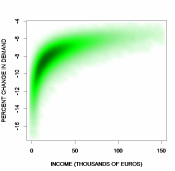|
Intelligence, Research, and Optimization
GLOBMOD activities focuses on the science and on the economics of health, providing analyses, and developing methods and tools to address questions such as:
What is the optimal way to improve population health with the available economic resources?
How do we measure the health and economic impact of individual technologies, programs, and policies? How much health can be gained by investing in a specific treatment, vaccine, or medical device? How much health can be gained by implementing a given intervention, program, or policy, at the national or sub-national level? Which segments of the populations are most likely to benefit from the adoption of a given health technology or from the implementation of a program? Which environmental and behavioral factors can cause and which can prevent diseases? And to what extent? What is the risk, and the likely impact, of a pandemic or of a natural disaster? How can we improve measurement and understanding of determinants of health? What is the cost of poor health to individual patients and to health-systems? How can we ensure a more efficient and equitable access to healthcare? To answer these questions:
Methods
We extract evidence using one or more of the following techniques: - Machine Learning; - Statistical Data Analysis; - In-depth Literature Review; - Systematic Literature Review; - Meta-analysis of Literature Review. Depending on need, we implement models using one or more of the following techniques:
- Agent-Based Simulation; - Discrete-Time Simulation; - Markov Cohorts; - Markov-Chain Montecarlo Simulation; - Ordinary Differential Equations; - Stochastic Differential Equations; - Decision Trees; - Multi-Level Regressions - Bayesian Networks. Software
We work with the following software packages: - In-house produced code in C/C++ - MS Excel + VBA; - R; - Berkeley-Madonna. On demand we can work with: - TreeAge; - Matlab. Other software environments may also be considered, depending on project needs. |

